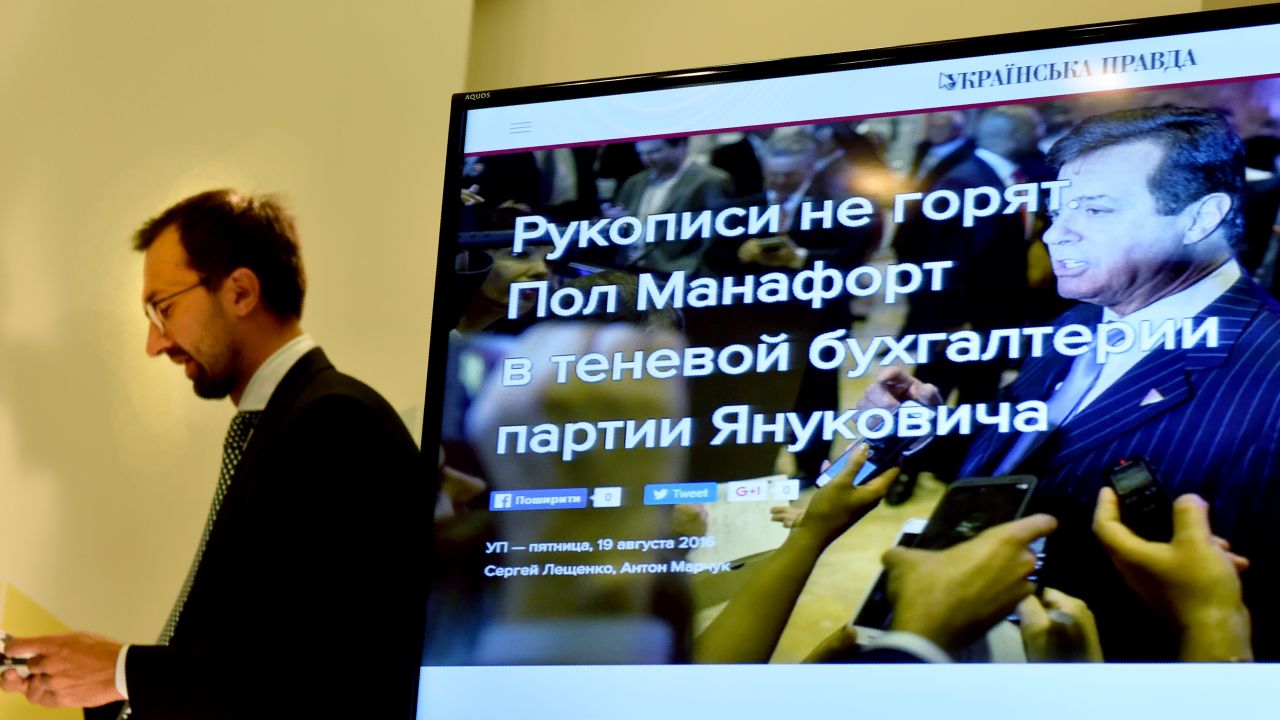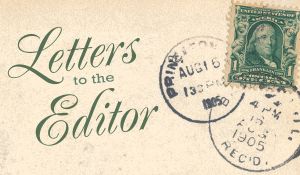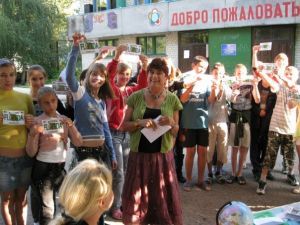
Ukrainian journalist and member of parliament Serhiy Leshchenko holds papers in front of a screen displaying a picture of Donald Trump's ex-presidential campaign chairman Paul Manafort during a press conference in Kiev. (Photo by Sergei Supinsky/AFP/Getty Images)

After reading our Trump-Russia Timeline, Francine “Fran” Curro Cary wrote to us about her experiences in Ukraine as a Peace Corps volunteer. Her letter to the editor has been lightly edited for clarity.
Paul Manafort had been busy working in Ukraine when I arrived in 2009 as a Peace Corps volunteer. Our experiences could not have been more different.
Manafort, who would later become a campaign manager for Donald Trump’s 2016 presidential election, probably spent much of his time at his office in the Ukrainian capital, Kiev, or running back and forth between Kiev, Moscow and Cyprus, where there are big banks that cater to the rich.
I spent most of my time in Starobelsk, a rural town in far-eastern Ukraine near the Russian border. This is the industrial heartland of Ukraine, called the Donbas — it covers Lugansk and Donetsk oblasts. Friends joked that I could see Russia from where I lived. They weren’t far off.
Manafort was there working to improve the image of Prime Minister Viktor Yanukovych and his pro-Russian Party of Regions. He helped rebrand Yanukovych as an anti-corruption reformer seeking closer relations with the West.
“The West has not been willing to move beyond the Cold War mentality and to see this man and the outreach that he has extended,” Manafort said in 2007. The New York Times described Yanukovych’s reinvention under Manafort as: “[A] remarkable transformation for a man who was often portrayed as the archvillain in the events surrounding this country’s Orange Revolution in 2004, beginning with the dioxin poisoning of his rival for president, Viktor A. Yushchenko, a mystery that has never been solved.”
It turned out to be a lucrative gig for Manafort: We now know that his consulting firm received more than $17 million from the Party of Regions for two years of work. If handwritten ledgers kept by the Party of Regions are anything to go by, Manafort received even more in cash payments in the years that followed, according to reporting by The New York Times.
In 2010, Yanukovych and his revised image ran for president of Ukraine. I accompanied friends to polling places in Starobelsk, but they were not behind Yanukovych. He’s an old-guard old-timer, people would say, dominated by the oligarchs.
But for Yanukovych his gamble on Manafort paid off; he won the election, beating Yulia Tymoshenko, one of the reformist leaders from the pro-democracy Orange Revolution.
After his election, Yanukovych quickly reverted to his old ways. He re-aligned foreign and trade policy toward Russia, clamped down on the media and had a number of opponents, including Tymoshenko, imprisoned. We now know how that all turned out.
Manafort worked for other Ukrainian and Russian oligarchs as well, like mineral magnate Oleg Deripaska, a member of Putin’s inner circle who paid him handsomely to promote Russian interests and to curry favors with the US. He worked with Deripaska on a plan to “greatly benefit the Putin government,” according to reporting by The Associated Press, signing a $10 million annual contract with Deripaska for his efforts.
“Manafort proposed in a confidential strategy plan as early as June 2005 that he would influence politics, business dealings and news coverage inside the United States, Europe and former Soviet republics to benefit President Vladimir Putin’s government,” according to The AP.
Manafort arranged special meetings, like the one between Yanukovych and Obama in 2010, to show that the Ukrainian president had gained respect in the West. Other meetings have since come to light and now figure in the multiple investigations of Trump’s Russian connections, including the June 2016 meeting between a Russian lawyer and Donald Trump’s inner circle, including Manafort, that was set up to receive damaging information about Hillary Clinton.
While Manafort worked with the rich and powerful, I worked with the ordinary and the powerless. He worked from the top down. I worked from the bottom up.
It was my great privilege to become part of the community of Starobelsk, to learn about the history, culture and folkways of Ukraine, and to find out the best way I, an American stranger, could help the people achieve their dreams. What did they want? What did they need? What were their stories? I was there to help. This is what Peace Corps volunteers do.

Fran Curro Cary in Ukraine (Photo courtesy of Curro Cary)
I discovered there was great interest in learning English and practicing with a native English speaker, so we started an English club at the library. I learned the library had no English-language books, so we had a successful book drive, with American friends joining in. I learned the library needed computers and the community needed free public access to the internet, so we applied for a grant to the Bill and Melinda Gates Foundation. The library got the grant and 10 computers and WiFi. The reading room became a community resource.
I learned through my work with Victoria, a human-rights nongovernmental organization (NGO) established by Starobelsk resident and activist Vera Flyat, that many people were victims of violence or falsely detained for crimes they did not commit. That led to a “Know Your Rights” project that reached 10 rural villages around Starobelsk.
I learned that Camp Sosnovy in the small village of Lymon, for kids from all over Lugansk oblast, would love to have an English speaker with them in the summer, so armed with my trusty English-Russian dictionary I joined them. I wonder where these wonderful kids are now. I wonder if they have been hurt or if they had to flee their homes.
While I tilled the fields, as it were, Manafort milked the oligarchs. He sure made more money than a Peace Corps volunteer, who got a monthly stipend closer to what the average Ukrainian lived on, about $300 a month.
What I didn’t know then, what no Peace Corps volunteer knew, was that while we worked with dedication to strengthen and support Ukraine, Manafort was working to undermine it. As we worked on behalf of the people to help them build their communities, Manafort was working with Yanukovych on behalf of Putin to undermine loyalty to Ukraine. That remains one of the greatest shocks to absorb.
When I left Ukraine in 2011, unrest was growing, young people couldn’t find jobs, taxes were rising, the Party of Regions was viewed as a den of thieves, and Yanukovych’s approval rating was lower than Trump’s is now. My friends in Starobelsk worried about their jobs and railed against the rampant, outrageous corruption. Then all hell broke loose.
If you’re a serious reader of our website and have something you would like to say, Bill would like to hear from you. We’ll choose letters on an occasional basis as they seem relevant to an issue we have been following. Please keep your letter to a reasonable length. Email us at yourturn [at] billmoyers [dot] com.




